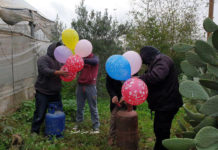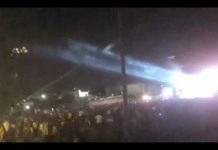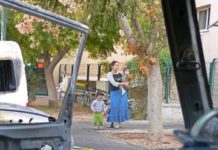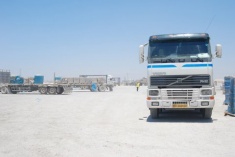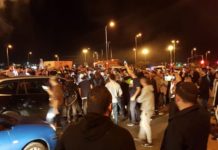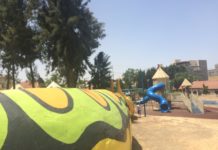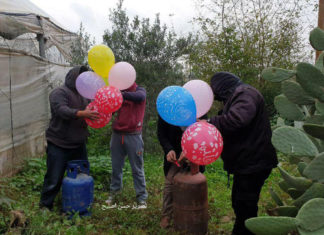A ceasefire, violating the relaxation, opening the crossing points, closing and reopening them, and closing them again. “Red Color” alarm, a Qassam being fired, a direct hit on a house, mortar shells being fired…
These were a few characteristics of last year’s ceasefire, or temporary relaxation. The question is: Who does it apply to?
The residents of Sderot and the Gaza Region are very familiar with the situation, so every harsh violation of the ceasefire doesn’t surprise them, but keeps reminding them of the feeling of frustration, which they have been experiencing for the past 8 years.
The ceasefire, which began on June 19 of this year, is supposed to end on the 19th of December 2008. According to data from the Intelligence and Terrorism Information Center, the ceasefire has been violated 13 times so far. Only last week, 6 Qassam missiles and 13 mortar shells were fired towards Israel. Israel responded by closing the crossing points for a few hours after each violation. According to evaluations, the Palestinians smuggle weapons and ammunition, and use the ceasefire for arming and training, in preparation for stormy days.
Hello, Who’s Relaxing Here?!
After a few days of complete silence, the “Red Color” alarm went off. As I watched the people run for cover, their faces showed surprise, amazement, and acceptance. Acceptance of a situation that is not going to change soon, even if it’s called by different names: Relaxation, ceasefire, or Tahadia.
I’ve spoken to Dr. Adrianna Katz, director of the Sderot Health Center, and asked her if there were any changes in the residents’ mental state since the beginning of the relaxation. Dr. Katz claims that the relaxation, as it is today, isn’t providing any help to improve the mental state.
Is there a difference in the number of demands for treatment, compared to the past?
“The difference is expressed by the fact that we don’t open the emergency center. The people are ok without the “Red Color” alarm, but each time it goes off, they go back a few steps. Furthermore, we’ve recently received treatment demands from people who were present at the Qassam attack that killed Mordehai Yosefov and the child Afik Zehavi, four years ago. They came to realize what happened, and they are dealing with how they feel about it, right in the time of ceasefire”.
Is it true that the anxiety increases during times of relaxation?
“Not for everyone. If we could define this relaxation as a real relaxation, we might be able to discuss real post-traumatic symptoms, but apparently we can’t. Every few days, the alarm goes off, or mortar shells and Qassam missiles fall”.
What happens to people during times of relaxation? Do they repress their feelings of anxiety?
“Some of the people don’t truly believe in the relaxation, so they can’t really relax. I’m talking about mental relaxation. It’s like anticipation for something to happen, because it’s impossible for it not to happen. That feeling doesn’t allow you to live in peace and serenity. It’s a feeling of uncertainty, which leads to lack of confidence. Instead of thinking ‘what will happen’, they think: ‘when will it happen?’ and it’s not a good thing.”
Country’s Anxiety
“The uncertainty, and everything that’s been going on for 8 years, is much bigger than a Qassam missile which is being fired from Beit Hanun. It’s one gigantic Qassam missile, and we can’t predict where it’s going to hit. I believe that today we can talk about anxiety present across the country. You can witness a variety of threats every day in the news, starting from an earthquake in China all the way to the Iranian threat. We live in an era which ignites the anxiety”.
What do you feel when you hear the “Red Color” alarm?
“At first, I didn’t feel anything. I didn’t pay attention to it. It was like child’s play to me. I didn’t know what a Qassam missile was. Now, even more than I fear the Qassam, I feel humiliated – humiliated, because I have to hide under the desk, or run to the protected room. Today, I feel the mental exhaustion which is the result of 8 years of war. No one is immune to this reality. One time, during an interview to the Galei Tzahal radio station, I was asked: ‘How come professional people get scared?’ The question frustrated me, but I politely replied that a professional person is a human being, and obviously is affected by fear, anxiety, and by questions that cause discomfort”.
Are these feelings present during times of relaxation, too?
“You feel it during times of relaxation, too. I say to myself: ‘the beeper doesn’t beep anymore’, and after the third day it does beep and tells me about a direct hit on a home. Then, I tell myself that it’s not going to be over soon, and ask myself what’s going to become of us? I think that the Israeli people’s compass has broken down completely. Not long ago, I didn’t feel this way, but after eight years of seeing that things aren’t changing for better, but for worse, you just can’t believe it. I started feeling this way four years ago, after a Qassam missile hit, when I realized that the same Qassam which is being prepared in a kitchen, can also cause death”.
How many anxiety victims contact you?
“Many bodies which deal with mental health have arrived in Sderot. They receive patients as well, so our numbers went down a bit. We have approximately 100 people on our waiting list. Besides them, we don’t see many new people, for reasons I don’t know”.
Apparently, the decrease in the amount of demands for treatment is due to the emigration out of the city. Approximately 1500 patients are receiving treatments at the mental health center, and the numbers are rising. We didn’t get a precise answer to how many anxiety victims live in Sderot, because most cases aren’t reported. 70%-94% of the children are anxiety victims. Even during this time of relaxation, the mental damage can be minimized by group therapy, psychotherapy, medical treatment and body relaxation treatment, according to Dr. Katz
In December 2007, a missile landed directly on the Amar family’s home – 11-year-old Liz’s neighbors. The house remained damaged for five months, and a month ago, after much negotiation with the property tax people, the repairs finally began.
The missiles’ threat and consequences are very familiar to Liz. She knows that the same type of Qassam missile that landed near her home can hit her home too in the future. The damaged Amar home serves as a daily reminder to this.
“The truth is that it’s hard living here, and despite the people who say that a ceasefire is taking place, missiles are being fired at us, and the other side says it’s by mistake. You can’t go outside to play, and everything feels closed. The difference between a child from Sderot and a child from another city is that the child from another city can go outside and play anytime he/she wishes, and the children of Sderot run every 5 minutes”.
Liz Sasson, 11, Doesn’t Believe the Palestinians
Do you believe in the ceasefire?
I think that the Palestinians can’t be trusted. For them it’s a real ceasefire. They use it to arm themselves, and once it’ll be over, they’ll fire everything at us. My mom and I say that this is simply the silence before the storm. We won’t do anything to them, and in the meantime, they’ll pull out pipes, prepare Qassam missiles, and fire them at us.”
What do you do when the alarm goes off?
“When the alarm goes off, you need to run in order for the Qassam missile not to hit you or near you, and you need to find a bomb shelter or a protected space”.
Danny Dahan, who was born in Sderot and lives in Kibbutz Or Hane’r (which is considered a part of the Gaza Region), arrives to Sderot every day in order to manage the family business, a supermarket.
Can you feel the relaxation?
“On the day the relaxation was declared, media from all over the country arrived at my supermarket. They asked the clients for their opinion, and I stood and watched. The clients replied: ‘Forget it, it’s not going to happen, it’s not going to last, it’s nothing.’ I couldn’t see optimism in their eyes, and it’s not because the people of Sderot aren’t optimistic. The people of Sderot are the most optimistic people there are, because if they weren’t, they wouldn’t have been living here. However, they are being realistic, and they know that both our government and the Hamas have lost the public’s trust. The Hamas violates the relaxation, and the Israeli government doesn’t do anything about these violations. There’s no doubt that we can feel the relaxation – Less Qassam missiles are being fired at us”. Danny emphasizes that the people of Sderot wish for relaxation, and grasp it with both hands, but they are also realistic, and so they remain alert and prepare themselves for the next Qassam missile.
“We don’t believe, and when there’s no belief, there’s expectation, instead. Give me the Qassam missile already, and let’s get it over with.
“Our state of relaxation isn’t related to the fact that more or less Qassam missiles are being fired. The relaxation is supposed to help us sleep better at nights. If I’m still not allowing my children to play outside, it means that I’m not relaxed. If I’m not going out with my wife and leaving my children with a babysitter, it means that I’m not relaxed. If our family is like a single parent family, because one of us has to stay with the children and the other has to go to work, it means that I’m not relaxed. I don’t call it ‘a relaxation’. I call it a type of ‘pause’. Indeed, there are less fired missiles, but the relaxation is limited to half a year, and that time is almost over. What’s going to happen afterwards?”
What do you think needs to happen in order for the situation to change?
“I think that there needs to be a war, and then I foresee peace. That’s how it’s like in the world, there’s war and afterwards there’s peace. We have been preparing ourselves for war for 8 years. There isn’t a single person in the city that hasn’t experienced a Qassam missile hitting nearby. We don’t know what’s going to happen to us in case a war breaks, but we’re willing to take it. There will be casualties on both sides, and in the end, we’ll sit around a table, discuss and plan the future. Either a longer pause for a few years, or the peace we have long been wishing for. It’s a procedure that needs to take place, otherwise nothing is going to change. This is the reality.”
Gad Yanai is nine-years-old. Two years ago, a Qassam missile landed in his family’s yard. His dog, Kate, was injured from shrapnel, and she goes berserk every time the alarm goes off. This March, a Qassam missile landed on the house’s third floor. Luckily, it didn’t explode.
Gad does not feel any safer because of the ceasefire.
“Sometimes it’s calm, and sometimes a lot of Qassam missiles hit us, but we can survive,” he said. “A child that lives in Tel Aviv can sleep peacefully and has nothing to fear from when he goes outside to play. A child from Sderot won’t go outside to play, because he fears to die from a Qassam missile. That child won’t fall asleep at night, either, because he’s too scared to not hear the alarm going off”.
What is it like to live here, when you have only 15 seconds to take cover?
“Some people get used to it, and some people are scared. We have all sorts of drills at school and at home, testing the public address system and etc. When the “Red Color” alarm goes off, I fear that I won’t make it to a protected place, and when I do make it, I pray and recite ‘Hear O Israel’ (Shma’ Israel) and Song of Degrees (Shir Hama’alot).”
Do you believe in the ceasefire?
“For me, the ceasefire is a lie, because we can hear nearby booms at nights, and they say that either the ceasefire is only for a few hours, or that Qassam missiles have landed.”
Gad said that he’s not feeling safe during the ceasefire, because the Palestinians can surprise them with a Qassam missile barrage.
“They are gathering Qassam missiles right now, so they will be able to launch them at us.”
What do you think we can do?
“If all the people of Sderot would gather together, go to the prime minister and make noise around him, like the noise of the Qassam missiles we live with, maybe it would encourage him to order a larger scale operation in Gaza, and we will finally be able to live in peace, with no fear.”
Time will tell about the consequences of the relaxation. It might be just a pause, or perhaps it’s the beginning of a new era. What’s important is that during the writing of these lines, there’s silence. As relative as it is, it allows us to take a breath and gather up strength for the next round.
Photo: Hamutal Ben Shitrit
Video: Meital Ohayon
Video editor: Eliran Hen



